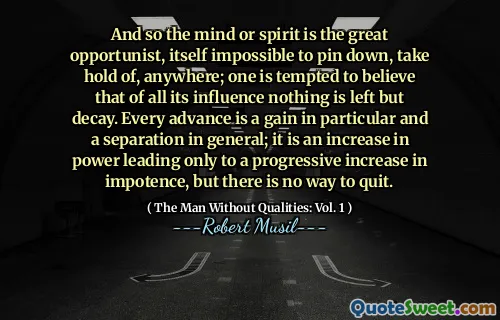
And so the mind or spirit is the great opportunist, itself impossible to pin down, take hold of, anywhere; one is tempted to believe that of all its influence nothing is left but decay. Every advance is a gain in particular and a separation in general; it is an increase in power leading only to a progressive increase in impotence, but there is no way to quit.
This passage delves into the paradoxical nature of the human mind or spirit, portraying it as an inconstant and elusive force that resists confinement and definitive understanding. The idea that the mind is an 'opportunist' suggests that it seizes upon chances for growth, but due to its inherent nature, these chances are fleeting and cannot be fully grasped or controlled. The perception that its influence diminishes into decay underscores the transient quality of mental pursuits and the inevitable decline of even our most significant advancements.
The notion that 'every advance is a gain in particular and a separation in general' highlights the complex costs associated with progress. While one item or idea might evolve or improve, this often results in division—be it in ideas, relationships, or societal structures—suggesting that progress simultaneously fosters unity and disunity. The phrase 'an increase in power leading only to a progressive increase in impotence' speaks to a Proustian or existential dilemma: as we gain more tools and capabilities, we can become increasingly impotent in the face of certain fundamental realities of existence, such as mortality, meaning, and the subconscious.
This cyclical tension suggests a state of perpetual striving without ultimate resolution. The assertion that 'there is no way to quit' resonates with the human condition of relentless pursuit—our innate drive to understand, control, or transcend limits—despite the likelihood that these pursuits may ultimately deepen our sense of helplessness or futility. Such reflections provoke a contemplative stance on progress, power, mastery, and the ephemeral nature of understanding, prompting us to consider whether true fulfillment lies in mastery or acceptance of our inevitable limitations.
---Robert Musil---






